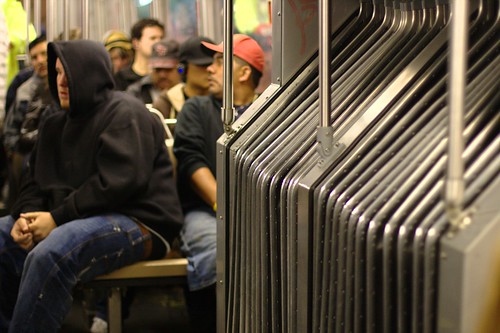 I was recently sent a mass email (I will paste the email into the comments) from a family member which outlined the plight of the small business owner. Basically, when you own a company and it makes a profit at the end of the year, this is what you have to put on your tax return. So, when one considers Obama's screw all the people who make over $250,000 shtick, one cannot help worry about the group that is responsible for something like 80% of all employment (I'm not sure about this number and didn't feel like looking it up, feel free to do so, it might be even higher). Personally, I think it would be dumb to do anything to hinder job growth right now. The email that I am referring to was told from the perspective of the president of a company who made $530,000 in profit from the company. He argued that with that $530,000 he has to re-invest in the company so it can grow, and that how can he do that when he is getting taxed so strongly. With these things in mind, I present An Argument for Taxing the Wealthy (including small business owners to make over $250,000).
I was recently sent a mass email (I will paste the email into the comments) from a family member which outlined the plight of the small business owner. Basically, when you own a company and it makes a profit at the end of the year, this is what you have to put on your tax return. So, when one considers Obama's screw all the people who make over $250,000 shtick, one cannot help worry about the group that is responsible for something like 80% of all employment (I'm not sure about this number and didn't feel like looking it up, feel free to do so, it might be even higher). Personally, I think it would be dumb to do anything to hinder job growth right now. The email that I am referring to was told from the perspective of the president of a company who made $530,000 in profit from the company. He argued that with that $530,000 he has to re-invest in the company so it can grow, and that how can he do that when he is getting taxed so strongly. With these things in mind, I present An Argument for Taxing the Wealthy (including small business owners to make over $250,000). 1. While it is true that the profit of a small business gets recorded as income for the business owner, I'd like to point out that the taxable income (net) is after business expenses which includes re-investing in the company. So using the above example, if this guy were to invest $284,000 back into his company then his net would be $250,000- and he'd be under the threshold. And by the way, if someone were to net out more than $250,000 from their company- well then I'd argue that they do deserve to pay that extra 5%, as you will see below.
2. Furthermore, a small business is an asset, just like a home or a car is an asset. When you re-invest into an asset, you typically increase the value of the asset in the process. I mean what kind of a moron would invest money in their company without the hope of it increasing the revenue/profit/value of the company by doing so. So, the boo-hoo I have to re-invest into my own company line is bullshit, you are investing in an asset you posses just like you invest in your 401k, or your house- the hope is that you will be able to sell it later and cash out the money you put into it. Now granted, a small business is a LOT risker than a 401k, savings, or a home- but hey that's the perils of a small business owner.
3. People should pay in proportion to the services they use, right? If I use more electricity, I should pay more. If I drive a truck on the government funded highways, and I profit from these taxpayer funded roads, then I should pay more to help keep them up and running. This is also true for the wealthy. By definition, if you are wealthy then society has benefited you. Granted, you may have worked hard for you money, but regardless, the social system that we live in and is how it is structured has lead to you being able to accrue wealth in one form or another. If we had a chaotic society, or an anarchical society, then odds are, you wouldn't be doing as well, or benefiting so much (freedom of economy is typically the first thing to go in a totalitarian or fascist regime).
This disproportionate benefital relationship between the haves and the have nots rationally leads to the conclusion that the haves should pay a bit more to keep society functioning, so that their business will continue functioning, so that they will be able to continue with their way of life. It is actually a selfish view that I am taking here, even though the results are unselfish. Makes sense to me...
4. This guy is basically a proponent of the trickle down economic theory adopted by Regan in the 80s. All that I have to say is that after 20 years of growth, this latest downturn has reduced us to pre-1982 levels and erased all of the supposed gains that trickle down economics (which reigned over those 20 years) produced. This may be surprising, but trickle down economics do not work. It has been proven to not work over these past 20 years, over the past 8 years, the average income of Americans has fallen by approximately 5%. Meanwhile, the top 1% wealthiest managed to accumulate 99% of the wealth in the country, a first in the history of the US. Never before in the history of our country has so much wealth been accumulated into such a small percentage of people.
Really though, is it surprising that trickle down economics does not translate into wealth for the middle class? I mean basically what you are saying is, Once you are rich, you stop being greedy. That really is the fundamental tenet of trickle down economics. Being as skeptical as most conservative economist who believe this, you would think that they wouldn't believe so strongly in the philanthropic soul of the rich. They got rich by being cut throat and saving every dollar they can (which I have no problem with), but why would you expect that to change if you just give them more?
5. $250,000 for your net income is over 500% of what the average American makes. That's five times (5x) more than the average American makes. I mean if you make that much more than the average person, shouldn't you foot a greater percentage of the bill? I make more than my girlfriend does (right now) so I pay proportionately more rent and bills and stuff. I consider this just and fair, why wouldn't this same principle apply to the wealthy?












































